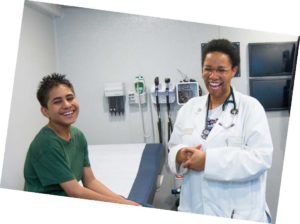NorTex 2021 Fall Newsletter
September 29, 2021 • NorTex
THE NORTEX NEWSLETTER
The Continuing Pandemic and its Effect on Younger Patient Populations
The COVID-19 pandemic has required health care professionals to develop new ways to prevent the infection from spreading within their patient populations. Even
with the advent of the COVID-19 vaccines and various public health mandates and recommendations, the pandemic continues with more virulent variants that target younger patients and a similar rise in misinformation. To face these challenges, an interprofessional and interdisciplinary approach is needed. The Centers for Disease Control and Prevention and the Tarrant County Public Health Department recently awarded a grant to the University of North Texas Health Science Center’s Department of Pediatrics and Women’s Health, to engage and improve vaccination rates among 12-26-year-olds in Tarrant county. Since vaccine hesitation and resistance is a multifactor issue, the investigators have decided to use a similarly multifactor approach. NorTex is a partner in this endeavor and will assist with engaging member clinics and providers. Since there is so much misinformation about COVID-19, the vaccines, and various treatment options, education is a key component of reducing the spread. Study investigators have decided to create and refine new content that will be used to creatively engage patients in outpatient settings. Since a large number of vaccine-hesitant patients come from historically marginalized groups, the study will have an emphasis on them. Additionally, study physicians are designing a curriculum for health care providers and scientists to best equip our community providers to
reduce COVID-19’s reach.
Community participation is key in a study of this magnitude, so engaging and receiving feedback and evaluation from community leaders and participants is critical. To do so, the study team has reached out to Tarrant County community leaders through previously established collaborative partnerships and will ask for their help in reaching marginalized community members. Additionally, the Pediatric Mobile Clinic, a “clinic on wheels” that is a part of UNT Health, will serve as a way to increase vaccination rates by holding vaccine drives at various community locations including at places of worship. This approach will hopefully reach a large number of children and young adults who do not have easy access to health care. The clinic’s approach will be supplemented by other vaccine drives at UNT Health and partner organizations, including the Fort Worth Independent School District. While the challenge of vaccinating our community will continue in the near future, collaborative partnerships and innovative approaches may be the only way for us to defeat COVID-19 once and for all. This initiative is led by Dr. Shane Fernando, Department of Pediatrics and Women’s Health, University of North Texas Health Science Center at Fort Worth.
NORTEX RESEARCH PROJECTS
FEATURED CURRENT NORTEX PROJECT
Substance Use Disorder in Individuals with Intellectual and Developmental Disabilities
NorTex has teamed up with the University of North Texas Health Science Center School of Public Health, the System College of Pharmacy, and the Dallas-Fort Worth Hospital Council Foundation on a project funded by the Texas Council for Developmental Disabilities. This multidisciplinary team is investigating substance use disorder (SUD) in individuals with intellectual and developmental disabilities (IDD). We are conducting the final analysis for all four parts of this one-year study to better understand this complicated topic. The project goals are to estimate the percentage of individuals treated for SUD that have IDD, identify barriers for individuals with IDD to get treatment for SUD, and identify best practices for treating SUD among individuals with IDD.  We are in the process of completing a review of the literature published in the last 20 years to identify gaps. Semi-structured interviews were also conducted with health care providers and administrators from SUD treatment facilities across the state to better understand their intake and treatment protocols for individuals with IDD. In addition to virtual focus groups and interviews, researchers mailed surveys to 1,000 licensed SUD treatment facilities. The survey consisted of questions about patient demographics, treatment protocols at each facility, and their understanding and perception of best treatment practices for individuals with IDD. Finally, researchers analyzed hospital visit data from the Dallas- Fort Worth Hospital Council to determine if individuals with IDD present for repeated emergency room visits or have repeat hospitalizations to address substance use disorder more often than those without IDD. Data analyses will be completed by Winter 2021.
We are in the process of completing a review of the literature published in the last 20 years to identify gaps. Semi-structured interviews were also conducted with health care providers and administrators from SUD treatment facilities across the state to better understand their intake and treatment protocols for individuals with IDD. In addition to virtual focus groups and interviews, researchers mailed surveys to 1,000 licensed SUD treatment facilities. The survey consisted of questions about patient demographics, treatment protocols at each facility, and their understanding and perception of best treatment practices for individuals with IDD. Finally, researchers analyzed hospital visit data from the Dallas- Fort Worth Hospital Council to determine if individuals with IDD present for repeated emergency room visits or have repeat hospitalizations to address substance use disorder more often than those without IDD. Data analyses will be completed by Winter 2021.
Project Investigators: Kimberly Fulda, DrPH (PI); Tracey Barnett, PhD; Marc Fleming, PhD; Scott Walters, PhD
FEATURED COMPLETED NORTEX PROJECT
Research Interest Differences by Gender and Race/ Ethnicity: Analysis from the North Texas Primary Care Practice-Based Research Network (NorTex)
Background: Recruiting and increasing participation of women and racial/ ethnic groups remains an ongoing struggle despite the National Institutes of Health (NIH) Revitalization Act mandating the inclusion of these populations. This study examined gender and racial/ethnic differences in research interest in participating in practice-based research network (PBRN) studies focused on cardiovascular disease (CVD), diabetes, cancer, and mental health research.
Methods: A total of 1,348 participants and 18 NorTex clinics from the North Texas Primary Care Registry Project (NRP) database were included in this cross-sectional study. Participants who self-reported as non-Hispanic white, Hispanic, or non-Hispanic black were included. Logistic regression was used to determine if gender and race/ethnicity predict interest in cardiovascular disease, mental health, diabetes, and cancer research. Analyses controlled for age, smoking status, and diagnoses.
Results: Of participants, 72% were female, 34.5% were black, and 24.4% were Hispanic. Seventy percent (n= 942) of participants were interested in CVD research, the leading area of interest. Mental health research (56.3%, n= 755) was the second highest area of interest, while cancer had the least interest (38.4%, n= 515). In adjusted analyses, gender did not predict
interest in CVD, diabetes, cancer, or mental health research. However, race/ethnicity significantly predicted interest in diabetes
and cancer research.
Conclusion: Results indicate that researchers should direct their studies toward specific gender and races/ethnicities based
on both health disparity and research interest; not just one factor alone.
Project Investigators: Anna Espinoza, MD; Tanjina Shabu, MPH; Kimberly Fulda, DrPH; Sydney Manning, MS; Roberto Cardarelli, DO, MPH, MPA
PREVENTING AN OUTBREAK OF HEPATITIS A AMONG THE HOMELESS POPULATION IN TARRANT COUNTY
When hearing about hepatitis A (HAV), many people think about contaminated food and water. However, in the United States, HAV is more commonly spread from person to person. The following groups are at highest risk for acquiring HAV infection or developing serious complications from HAV infection and should be offered the hepatitis A vaccine to prevent or control an outbreak:
- People who use drugs (injection or non-injection)
- People experiencing unstable housing or homelessness
- Men who have sex with men (MSM)
- People who are currently or were recently incarcerated
- People with chronic liver disease, including cirrhosis, hepatitis B, or hepatitis C
During 2017, a total of 1,521 outbreak-associated HAV cases were reported from California, Kentucky, Michigan, and Utah, with 1,073 (71%) hospitalizations and 41 (3%) deaths; the majority of infections were among persons reporting homelessness or injection or non-injection drug use. The person-to-person HAV outbreaks involving persons who use drugs or persons experiencing homelessness are ongoing, and case counts and geographic dispersion increased substantially in 2018. As of October 12, 2018, approximately 7,000 outbreak-associated cases had been reported from 12 states.
In the fall of 2019, Tarrant County Public Health (TCPH) convened a meeting of public health, health care, and emergency services representatives from surrounding counties to begin developing a plan for dealing with potential outbreaks of HAV in the Dallas Fort Worth metroplex area. This activity was interrupted
by the COVID-19 pandemic. In early spring of 2021, TCPH was made aware of an increase in the number of acute HAV cases among the homeless in an adjacent county. TCPH in collaboration with the Tarrant County Homeless Coalition (TCHC), John Peter Smith Health System (JPS), and the Texas Department of Health Services began to implement a program to prevent hepatitis A among the homeless population of Tarrant County. Teams of representatives from the above agencies began going out into the area of Tarrant County where encampments of homeless individuals reside and offering the HAV vaccine one day a week. After 2 weeks, 69 individuals had received the HAV vaccine. This program will continue until all homeless individuals (both sheltered and unsheltered) have been offered the HAV vaccine. It is a rare occasion when an opportunity to actually prevent an outbreak is possible. This is one of those opportunities. However, it is only possible when there is collaboration among community agencies such as these.
FEATURED MEMBER:
ADERONKE DOSUMU
 Aderonke Dosumu, MPAS- PA-C is Assistant Professor at the Department of Family Medicine and Adjunct Professor at the Texas College of Osteopathic Medicine (TCOM), University of North Texas Health Science Center (HSC). PA Dosumu is recognized for her nearly 10 years of work in the field of Pediatrics and Family Medicine, and she has helped improve the lives of patients throughout the community. PA Dosumu earned her master’s degree in physician assistant studies from the D’Youville College in Buffalo, New York. Prior to joining HSC, she worked at a pediatric clinic affiliated with Children’s Medical Center hospital in Dallas, Texas. In 2020 and 2021, she received the award for outstanding preceptor and master preceptor from the School of Health Professions (Physician Assistant Studies) and Society of Teachers of Family Medicine (STFM), respectively. PA Dosumu is committed to patient-centered care and appreciates the opportunity to provide care to an underserved population. She is very passionate about medical education, and she has taught students from different inter-professional schools. During the COVID pandemic, she collaborated with a faith-based women’s group to develop a monthly webinar called “Moms, Let’s Talk” to encourage a small group of women monthly. PA Dosumu works with various departments within HSC and NorTex on different research pilot projects. One of the projects focused on helping to bridge health care disparities in the refugee population within Dallas-Fort Worth. Her current work under the mentorship of Dr. Usha Sambammoorthi focuses on the impact of COVID-19 on mental health in women of color and ways to reduce racial and gender disparities in mental health, and to improve mental health outcomes using the “whole health” approach. She enjoys reading and volunteering as a children’s ministry Leader, and on weekends, she enjoys spending time with her husband and two children.
Aderonke Dosumu, MPAS- PA-C is Assistant Professor at the Department of Family Medicine and Adjunct Professor at the Texas College of Osteopathic Medicine (TCOM), University of North Texas Health Science Center (HSC). PA Dosumu is recognized for her nearly 10 years of work in the field of Pediatrics and Family Medicine, and she has helped improve the lives of patients throughout the community. PA Dosumu earned her master’s degree in physician assistant studies from the D’Youville College in Buffalo, New York. Prior to joining HSC, she worked at a pediatric clinic affiliated with Children’s Medical Center hospital in Dallas, Texas. In 2020 and 2021, she received the award for outstanding preceptor and master preceptor from the School of Health Professions (Physician Assistant Studies) and Society of Teachers of Family Medicine (STFM), respectively. PA Dosumu is committed to patient-centered care and appreciates the opportunity to provide care to an underserved population. She is very passionate about medical education, and she has taught students from different inter-professional schools. During the COVID pandemic, she collaborated with a faith-based women’s group to develop a monthly webinar called “Moms, Let’s Talk” to encourage a small group of women monthly. PA Dosumu works with various departments within HSC and NorTex on different research pilot projects. One of the projects focused on helping to bridge health care disparities in the refugee population within Dallas-Fort Worth. Her current work under the mentorship of Dr. Usha Sambammoorthi focuses on the impact of COVID-19 on mental health in women of color and ways to reduce racial and gender disparities in mental health, and to improve mental health outcomes using the “whole health” approach. She enjoys reading and volunteering as a children’s ministry Leader, and on weekends, she enjoys spending time with her husband and two children.


Social media